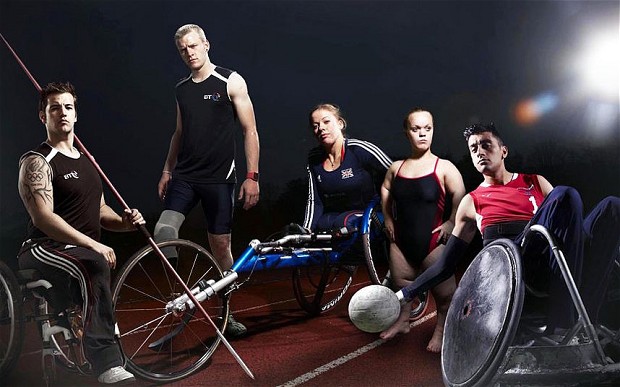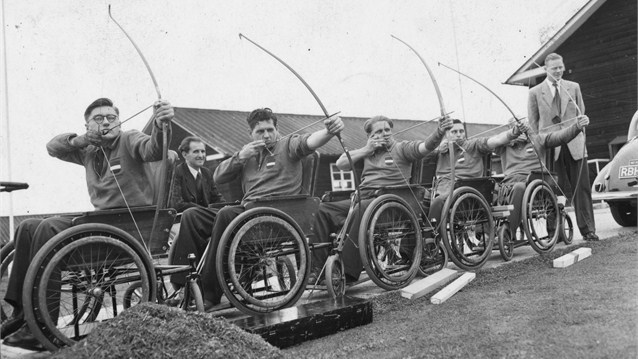
The Paralympic Games 2012 are here!
Tonight the Paralympic opening ceremony – tipped to be like nothing we have seen before – will signal the start of the London 2012 Paralympic Games. The next eleven days will, undoubtedly, be a fantastic spectacle of top-level competitive sport. Rest assured that Disability Horizons will be reporting on all the action!
The Paralympic Games are coming home
While the Olympic Games have roots in the legends of Ancient Greece, used originally as a means for athletes to achieve a mythical sense of eternal glory, the Paralympic Games have roots in the humble surroundings of Stoke Mandeville Hospital, in the English countryside where injured war veterans were treated.
Neurologist, Sir Ludwig Guttmann, believed that the disabled men and women under his care could contribute to society just as much as anybody else, and that sport was a means of achieving it. So, in 1948, with the backdrop of a war-torn Britain, they held the International Wheelchair Races. It included only a handful of hospitals, sixteen athletes and archery as the only sport.
What started out as a make-shift competition has now grown into one of the world’s greatest spectacles of highly competitive sporting action that utilises cutting edge technology. A total of 4,200 Paralympians, from 165 countries, will proudly represent their countries at London 2012.
Paralympian Oscar Pistorius recently said: “Being disabled doesn’t have to be a disadvantage. The great thing about the Paralympic Games is that they focus on ability, not disability.”
Perception of disability sport
The widespread interest in the London Paralympic Games can only be described as unprecedented. A record breaking 2.4 million tickets have been sold and, for the first time ever, the Paralympic Games are practically sold out. In some previous Paralympics, organisers had to bus in people to make up the numbers, but for London 2012, organisers are turning away millions of people trying to get their hands on any remaining tickets.
In another first, Channel 4, the UK’s publicly owned commercial broadcaster, which beat the incumbent BBC to broadcasting rights, will be providing live coverage of the Games in the UK from dawn till dusk in a manner usually reserved for the Olympic Games.
Previously, viewers in the UK have had to settle on a brief highlights show! But now, Channel 4 will be launching dedicated Paralympic channels, mobile apps and internet streams.
To date, the Paralympic Games have arguably been treated as an after-thought or the junior partner to the Olympic Games. But will this year’s new treatment of the Paralympic Games (where it’s almost an equal partner of the Olympic Games and something people are excited to be part of) change the perception of disability sport in years to come? And what will this new found exposure in the UK do for disability around the world?
It is not a question that can be easily answered and only the wisdom of future hindsight will provide any definitive conclusion, but it is fair to say that things will never be the same again.
Integration of the Games
A question that has always lingered, but is at the forefront this year, is whether the Olympic Games and Paralympic Games will or should ever merge into one single event. As we all know, history was made this year by Oscar Pistorius as he was the first Paralympian to compete in the Olympic Games. But was this a glimpse into the future where disabled and non-disabled athletes compete side by side or just a one off event?
In 2001, the International Olympic Committee and the International Paralympic Committee signed an agreement that any city winning the bid to host the Olympic Games would automatically host the Paralympic Games. The Commonwealth Games are already integrated, so will London 2012 and Rio 2016 be the last ever separate Paralympic Games?
As any city hosting the Games is stretched to its very limit, economic and logistical reasons might bring the Games closer together. However, the sheer size of both events may also prohibit them occurring in a merged Games and, unless there is any movement towards reducing the number of sports, it seems unlikely that full integration will occur in the foreseeable future.
Accessibility in a host city
Transport and infrastructure are issues that every host city seems to have problems with, which only serves to underline the barriers that disabled people are faced with in most of the world’s major cities.
Will London’s Paralympic Games place a greater onus and pressure on society to ensure that as much of the city as possible is accessible?
Already, Transport for London have retrofitted accessibility at many stations, such as making portable ramps available, and those who have been to the Olympic Games will have noticed the extensive arrangements made to ensure accessibility. However, will such arrangements continue post-Games once the spotlight has moved on?
Legacy of the Paralympic Games
The legacy of the London 2012 Games has been something the organisers have been keen to stress from day one. But how well and how far the optimism and inspirations from the 2012 Games will spread is a question that can only be answered over time.
But we do know that being disabled in 1948, when Dr Guttmann first initiated the idea of the Paralympics, is very different to now. Access, attitudes and inclusion have all progressed greatly.
With the public wanting more of that Olympic feel-good-factor and therefore keen to continue that optimism into the Paralympic Games, there can only be one outcome and that is to change stereotypes.
But, to secure a lasting effect once these Games have been and gone, charities, councils, government and society must ensure this progress is maintained and built upon.
Retired Paralympian Baroness Grey-Thompson recently asserted;
“Nelson Mandela once said that sport has the power to change the world, but I believe it goes beyond this. Paralympic sport has the power to change the world. The Paralympic Games will show the world what extraordinary athletes can do, who happen to have a disability. These Games will inspire a generation to think differently.”
The Paralympic Games and you
But having dissected the whys and wherefores of the Paralympics Games, it’s now time to pop the kettle on, grab some snacks, get comfortable and enjoy the upcoming festival of sport. These Paralympic Games are filled with action, drama and stories… and Disability Horizons is working tirelessly with you to capture this in words, pictures and videos, so make sure you don’t miss any of it.
Team DH
Feature image credited to The Telegraph, taken by Charles Fearn.
Check out…
• Our definitive guide to the Paralympics.
• Take a look at our article from one reader who tested out the new portable ramps on the London underground.
• I’m Spazticus: straight from the horse’s mouth.
Let us know how you’re celebrating the Paralympic Games and what disability sport you’re involved in – email us at editor@97c.026.myftpupload.com, tweet us @DHorizons or send us a message on Facebook. Share your experiences with our community for a monumental Summer 2012!
